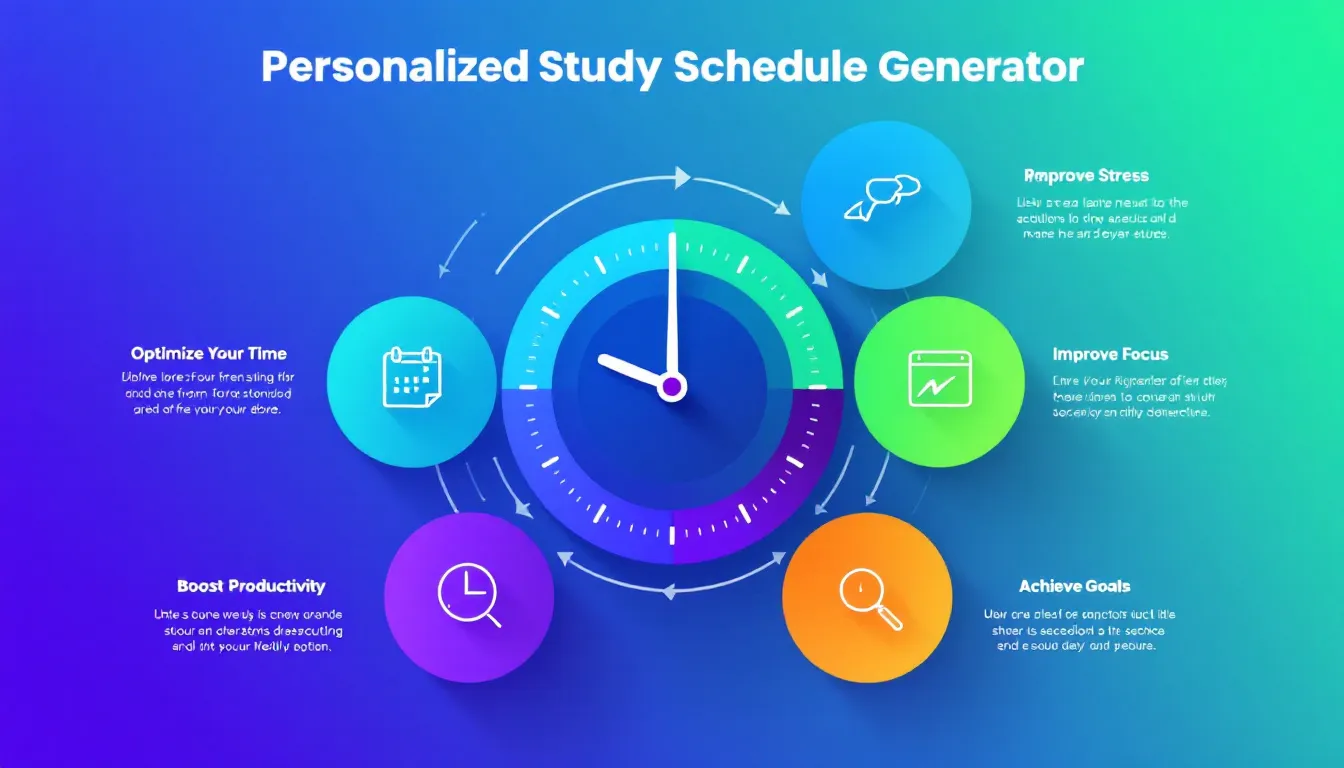Personalized Study Schedule Generator
Is this tool helpful?
How to Use the Personalized Study Schedule Generator Effectively
Follow these steps to create a study schedule that fits your lifestyle and learning goals perfectly:
-
Describe your daily commitments: Write about your routines, work hours, classes, and preferred study times that affect your availability.
- “I work night shifts from 10 PM to 6 AM, prefer morning study sessions, and attend yoga classes on weekends.”
- “I’m a freelancer with flexible hours but prefer studying in the late afternoon. I volunteer twice a week in the evenings.”
-
List your subjects or topics: Enter your subjects separated by commas to tailor your schedule.
- “Environmental Science, Creative Writing, Statistics, French Conversation”
- “Modern Art, Economics, Data Analysis, Spanish Grammar”
- Set your total weekly study hours: Specify how many hours per week you can dedicate to your studies, such as 20 or 40 hours.
-
Optional – Preferred study methods: Include your favorite techniques to help customize your plan.
- “Group discussions, note-taking, spaced repetition”
- “Audio lectures, self-quizzing, visual aids”
-
Optional – Learning goals: Share your targets or exam deadlines to focus your plan.
- “Aim to complete final project by end of semester and improve public speaking skills”
- “Prepare for certification exam in 6 weeks, boost coding speed and accuracy”
- Generate your schedule: Click the button to receive a tailored study plan that fits your inputs.
Review your personalized schedule and adapt it as needed. You can save or print it to keep your study routine on track.
What Is the Personalized Study Schedule Generator?
The Personalized Study Schedule Generator is an online tool that creates a customized study plan based on your unique daily routine, subjects, available study time, and learning preferences. It uses your inputs to organize study sessions that optimize time management and improve learning outcomes.
This tool helps you balance your academics with personal and professional commitments by suggesting study blocks when you’re most alert and ready to learn. It goes beyond generic advice by providing a schedule tailored to your lifestyle and goals.
By applying proven learning principles, it boosts your productivity, reduces stress, and supports long-term retention of knowledge.
Benefits of Using a Personalized Study Schedule Generator
- Efficient time management: Organizes all commitments and fitting study hours without conflicts.
- Focused study sessions: Helps you concentrate on one subject at a time with clear goals.
- Customized learning: Matches your preferred study methods and peak productivity times.
- Stress reduction: Provides a clear roadmap, reducing anxiety about exam preparation.
- Improved retention: Uses spaced repetition and effective scheduling to enhance memory.
- Flexible and adaptable: Lets you update your schedule as your availability or goals change.
Practical Applications for the Personalized Study Schedule Generator
Here are examples of how different learners can benefit from this tool:
Busy Freelancer Managing Multiple Courses
Alex juggles a freelance career with part-time online classes in marketing and graphic design.
- Lifestyle includes flexible work hours but frequent deadlines.
- Used the generator to allocate 15 weekly study hours focused on late evenings.
- Preferred study methods were project work and watching tutorial videos.
Alex now follows a balanced schedule that fits work demands and maximizes creative learning times.
University Student Preparing for Multiple Exams
Maria has exams in biology, sociology, and statistics coming up within a month.
- Input included daily lectures, lab sessions, and evening job shifts.
- Set 35 weekly hours with emphasis on biology and statistics closer to exam dates.
- Preferred study methods included group study and self-quizzing.
Maria’s personalized plan helps her balance revision across subjects and optimize exam readiness.
Adult Learner Returning to University
James is working full-time and pursuing a bachelor’s degree in computer science.
- Provided his fixed work schedule and evening family commitments.
- Requested 20 hours per week for coding practice, lectures, and assignments.
- Included preferred techniques like coding challenges and flashcards.
The generator created a manageable plan that fits his busy lifestyle while targeting skill development.
How This Tool Builds Your Study Plan
The Personalized Study Schedule Generator uses your inputs to distribute study time based on subject importance, urgency, and your preferred learning methods. It applies research-backed techniques like spaced repetition and interleaving to help you retain information effectively.
For example, if you set 30 hours for “Calculus, Literature, and Physics,” a sample distribution may look like:
- Calculus: 14 hours (47%)
- Physics: 10 hours (33%)
- Literature: 6 hours (20%)
It schedules shorter study sessions spread throughout the week to improve long-term memory:
Example session timings:
- Calculus on Monday, Wednesday, and Friday mornings
- Physics spread on Tuesday and Thursday afternoons
- Literature review on weekend evenings
The schedule also suggests incorporating your preferred study methods such as flashcards for physics formulas or group discussions for literature analysis, making your study time more productive and engaging.
Optimizing Your Learning Experience
Customize Based on Your Lifestyle
Input details about your daily routine so your study plan respects your energy levels and obligations. Whether you’re a morning person or prefer late-night sessions, the schedule adapts accordingly.
Balance Between Subjects
You can adjust focus according to exam dates or difficulty levels. This ensures challenging topics get more dedicated attention while maintaining steady progress in all areas.
Incorporate Effective Study Techniques
By specifying your preferred methods like summarizing notes, flashcards, or practice tests, your plan includes activities that engage you best, improving retention and understanding.
Remain Flexible and Update Regularly
Life changes, and so should your study plan. Update your inputs anytime to keep your schedule aligned with new commitments, goals, or changes in availability.
Use this tool as a dynamic guide to structure your time, reduce overwhelm, and achieve steady progress toward your academic objectives.
Important Disclaimer
The calculations, results, and content provided by our tools are not guaranteed to be accurate, complete, or reliable. Users are responsible for verifying and interpreting the results. Our content and tools may contain errors, biases, or inconsistencies. Do not enter personal data, sensitive information, or personally identifiable information in our web forms or tools. Such data entry violates our terms of service and may result in unauthorized disclosure to third parties. We reserve the right to save inputs and outputs from our tools for the purposes of error debugging, bias identification, and performance improvement. External companies providing AI models used in our tools may also save and process data in accordance with their own policies. By using our tools, you consent to this data collection and processing. We reserve the right to limit the usage of our tools based on current usability factors.







